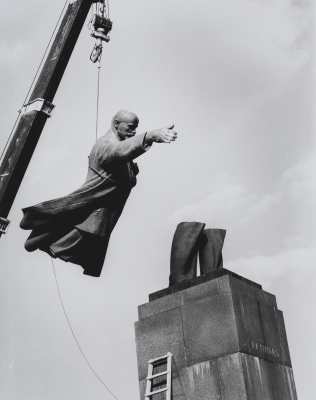100 Years in One Month: Prophesy About the End of the Soviet World

Antanas Sutkus "Farewell Party Comrades". Courtesy of the Lewben Art Foundation
For the majority of its inhabitants and foreign observers the Soviet Union seemed eternal. One of the two world powers, a victor of World War II, a creator of the atomic bomb, the first to send a human being into space, creating an alternative to the capitalist system, afraid of nothing, and untouchable. Even when in 1985 the energetic Mikhail Gorbachev came to power and announced wide-ranging changes, few realised how these intentions would end. One had to penetrate into the very core of the Soviet Union to see that the giant was standing on legs of clay which could crumble at any moment. For this reason, many people spoke about the collapse of the Soviet Union as a geopolitical surprise and just a small number said it was a logical end consistent with the facts and one that had already been spoken about and proposals made to prepare for it.
One of those sovietologists was Aleksandras Shtromas (1931–1999), who had worked for a couple of decades in institutions of higher learning in Great Britain and the USA. He was born in Kaunas into a Jewish family of intellectuals. World War II and the Nazi occupation of Lithuania was a fatal catastrophe for the Shtromas family, as indeed it was for all the Jewish community. Aleksandras’s father was murdered, while he together with his mother and sister ended up in the ghetto established by the Nazis. He managed to survive, but his mother was taken to the Stutthof concentration camp where, unable to withstand her torments, she took her own life. After the war he was adopted by Antanas Sniečkus, the head of the Lithuanian Communist Party. The young Shtromas was able to see from very close up a person who made a significant contribution to the creation of Soviet Lithuania. However, finding himself in the family of the communist leader did not stop the change in his world view: while studying in Moscow and later, Shtromas made the acquaintance of people who thought differently, found himself amongst groups of dissidents and from a believer in the Soviet system became a stern critic. Finally, his dissident activities became so intensive and bold that he was forced to leave the Soviet Union.
After arriving in Great Britain in 1973, he did not stop criticising the Soviet system. Perhaps because of experiencing how fanatically his stepfather believed in communism, Shtromas always used to stress the importance of ideology in the Soviet Union, while at the same time asserting that in Soviet society not a single person was left who was a sincere communist with a belief in the Soviet system and that in this sense all its inhabitants were ‘dissidents to a greater or smaller degree’. Even though this opposition was not open, its potential was huge. And if the system was supported by an ideology in which no one believed, then any kind of instability in the structure of Soviet power could result in its collapse, and no one would oppose that or regret it. And this might happen soon.
In the 1970s in the Western academic world this sounded like an academic prophesy, something at which many of his colleagues looked sceptically or even mocked publicly. But Shtromas did not stop repeating it and at the beginning of the 1990s, when the Soviet Union, in existence for more than seventy years, suddenly collapsed, he was one of those rare sovietologists whose earlier prognoses did not have to be thrown into the rubbish bin.